

Message from PorMSIC’s Vice-President for External Affairs

ANEM/PorMSIC is the Federation that aggregates the local Student’s Associations of all eight Medical Schools, legally representing all 10000 medical students of Portugal. Internationally, ANEM (across borders knowned as Portuguese Medical Students’ International Committee, PorMSIC ) also represents the Portuguese medical students, being, since its foundation, a full-member of the International Federation of Medical Students’ Associations (IFMSA).
The main activity of ANEM is related to the problems of Medical Education that affect medical students, both directly or not. Besides this major goal, our vision also concerns matters on Public Health, Reproductive Health and AIDS, Human Rights and Peace, Science and additionally the national organization of short summer medical clerkships and international cooperation on the logistics of a global Research and Professional Exchange Program.
Regarding our Exchanges Programs, both are widely known for their exceptional quality and warm welcoming, alongside our lodging conditions and social programs.

Message from PorMSIC’s NEO and NORE

Dear Exchange Student,

Firstly, in the name of our NMO - PorMSIC - we’d like to welcome you to the best experience of your life. The Exchanges Programs of the IFMSA are the largest student-run exchange programs in the world and mobilize more than 2000 students every year!
We congratulate you for your placement in our country, we will strive to give you all you need to achieve your goals and all the beautiful things our country has to offer.
We created this manual in order to provide you with all the information you should need for your exchange period, containing the main details of each local program, both academic and social, should you want to inform yourself about the Local Committee you’ve been placed at, or any other you’d like to visit during your stay.
We’d like to leave you the final message that all the following information was written down for us to be able to give you the most complete experience possible. We’re here for you and wish you a wonderful and life-changing exchange!
 (Bruno Gonçalves de Sousa) NEO (Pedro Dias) NORE
(Bruno Gonçalves de Sousa) NEO (Pedro Dias) NORE
Local Committees


Exchange Conditions
Digital Documents:
- E-AF
- Curriculum Vitae (SCORE only)

- Motivation letters (one per department/project)
- Recommendation Letter (SCORE only)
- Proof of enrollment in University
- English Language Certificate
- Passport Photo
- Health Insurance (to be sent with your AF - SCOPE only - and to be shown upon arrival - both)
- Liability Insurance (required for New University of Lisbon and Universidade do Algarve)
- Copy of Identification Card / Passport
We ONLY accept SCANNED COPIES of the documents (by uploading it at ifmsa.net)
SCOPE:
- You must choose 3 DIFFERENT CITIES and not 3 different universities.
- You must choose 4 DIFFERENT DEPARTMENTS, otherwise we may allocate you to any other department, in case your choice is not available.
SCORE:
- Three alternative choices for the research project and at least TWO different cities must be chosen.
- Exchange period allowed is stated on the contract agreement – AF’s that don’t respect it will be sent back.
SCOPE
• We can only accept MEDICAL STUDENTS!
• The student should bring his/her own white coat, stethoscope and handbook.
• The student will receive either pocket money or meal ticket for boarding.
• It’s mandatory to send the CC, otherwise the exchange will be cancelled.


• Substitutions can be made until few weeks before clerkship starts and must be for the same period.
• We prefer substitutions to cancellations.
• To obtain the SCOPE certificate: - At least 80% attendance IS REQUIRED. - IFMSA Evaluation Form and our own Evaluation Form MUST BE FILLED IN.
• We will cancel the clerkship if the student does not demonstrate a good knowledge of English.
SCORE
• We can only accept MEDICAL STUDENTS!
• The student should bring his/her own white coat.
• Students are expected to take active part in the project and to be theoretically prepared for it.
• Mice and/or other animals may be used in experiments.
• The student will receive either pocket money or meal ticket for boarding.
• We only accept students on calendar months.
• We can't guarantee the Exchange for students who don't send the CC at least 4 weeks before the required period.

Before Arrival
There will be moments where you’ll be able to share your own culture with the other incoming students, as well as your hosting officer, so bring typical food, drinks and products from your country!
The weather in July and August is very warm, so bring light clothes and sunscreen for the day and a bathing suit, in case you want to visit the beach!

Our Local Committees should provide you with a national SIM Card, you should therefore bring a free service cell-phone!
For some of our activities, you might get a discount if you bring your EURO26 (for european citizens) or ISIC card (www.isic.org), so don’t forget to ask for your card before your exchange












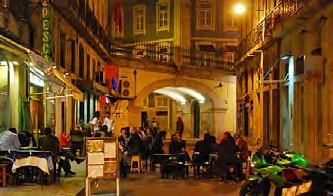




















NEO Bruno Gonçalves de Sousa neo@anem.pt
LEOs’ contacts
Braga (NEMUM) - di@nemum.com
Porto (FMUP) - rel.internacionais@aefmup.pt
Porto (ICBAS) - international.aeicbas@gmail.com
Covilhã (MedUBI) - intercambios@medubi.pt
Coimbra (NEM/AAC) - mobilidadeinternacional@nemaac.net
Lisboa (FMUL) - internacionais@aefml.pt
Lisboa (NMS|FCM) - leo@ae.fcm.unl.pt

LOREs’ Contacts
Braga (NEMUM) - di@nemum.com
Porto (FMUP) - rel.internacionais@aefmup.pt
Porto (ICBAS) - international.aeicbas@gmail.com
Covilhã (MedUBI) - dci@medubi.pt
Coimbra (NEM/AAC) - mobilidadeinternacional@nemaac.net
Lisboa (FMUL) - internacionais@aefml.pt
Lisboa (NMS|FCM) - research@ae.fcm.unl.pt

NORE
Pedro Dias nore@anem.pt

Braga is a city in the northwest of Portugal, considered the oldest Christian archdiocese in the country and one of the oldest in the world. Under the Roman Empire, known as Bracara Augusta, the settlement was center of the province of Gallaecia, being the biggest and most important Roman city situated in the territory where Portugal was born.
Lately, the city has become younger, developing over the past years in the fields of culture, sports and many others, also being the European Capital of Youth in 2012.
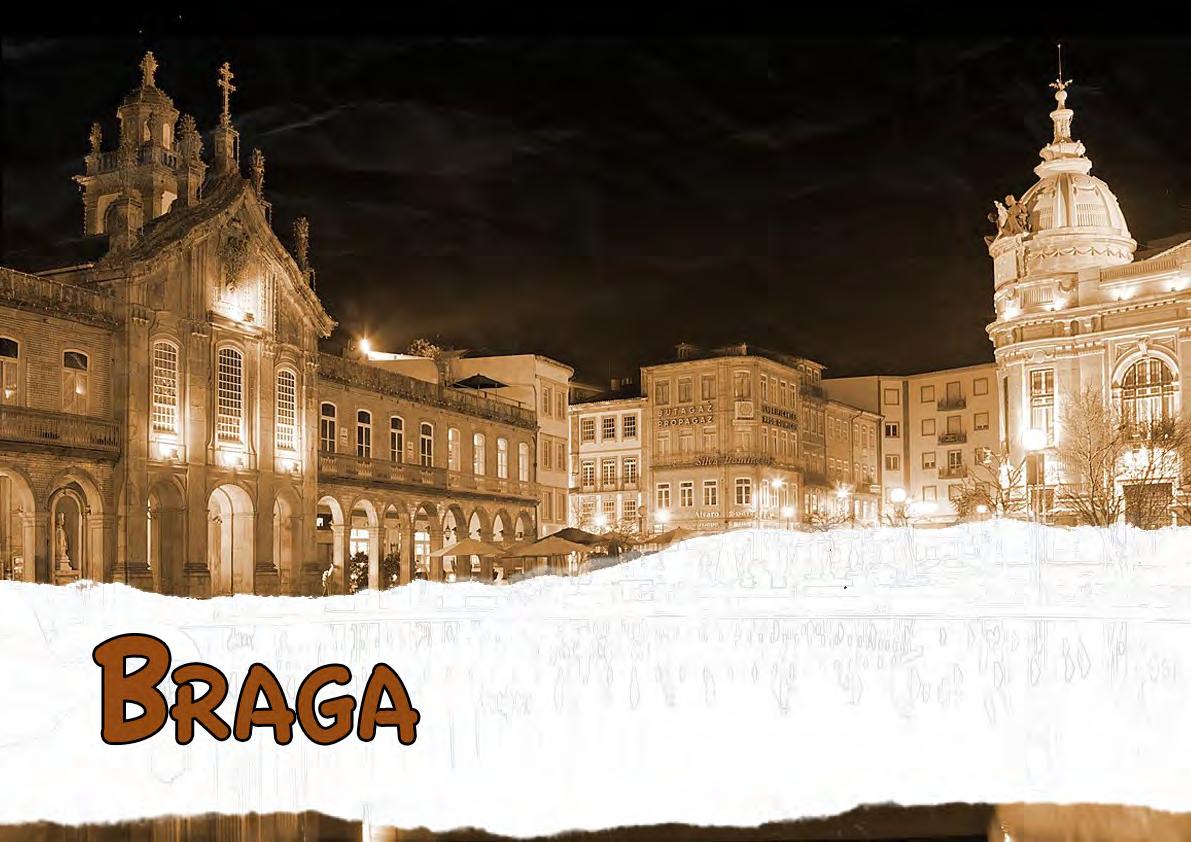
School of Health Sciences of Minho University
Minho University is a Public University located in the Area of Minho, founded in Braga in 1973. This is one of the larger Universities in Portugal, offering a vast amount of graduation and post-graduation courses.
The University is divided into two main campi: one located in the city of Braga (Campus of Gualtar) and one located in the city of Guimarães (Campus of Azurém). Both campuses are equipped with residences, cafeterias (where you can lunch or dine for 2,50€), libraries and a sports complex.

Localisation: http://goo.gl/maps/G6kTG
Local Committee
NEMUM, the medical students association of Minho University, was founded in 2003, in the School of Health Sciences.



Since then, we've been working in a lot of different areas, such as Community Health, Culture and Professional/Research Exchanges.
Our moto, said by Professor Pinto Machado, one the founders of the medical school, is "Nothing that is human can be unknown to a doctor”.
We have an excellent Exchange Program prepared for you. We want to give you an amazing experience and one of the best months of your life!
opportunity to develop scientific research skills and projects. In 2007, remarkable scientific institutions in the country, basing almost 300 researchers and offering hundreds of laboratory rotations to medical students.
There are 3 main domains in ICVS: neurosciences, microbiology and surgical sciences.


Localisation: http://goo.gl/maps/G6kTG


Getting to Braga
From Oporto
From Oporto's Airport, you can catch a GetBus shuttle which will get you to Braga's bus station where we will pick you up. There is also the possibility to get on a metro and then the train and arrive in Braga's train station, where we can also pick you up.

From Lisbon

From Lisbon, you can get a bus from Renex or Rede Expressos (bus companies) and they will get you to Braga's bus station or if you prefer catch a train to Braga's Train Station or you can catch a plane to Porto (there are some cheap Ryanair flights) and then get from there to Braga.

Informations


Lodging
The students will be hosted at one of two students hostels:
In Residência Santa Tecla, you have single or double rooms. In each floor, you can also use collective bathrooms, a common study room and a dinner room, equipped with microwaves.
In Residência Lloyd Braga, you will sleep in double rooms. Each room has a bathroom, a telephone, a television and a small fridge.
Boarding
The students will be offered five meal vouchers per week, redeemable in the cafeteria. You can use your ticket for lunch or dinner. There usually are two main dishes and a vegetarian alternative.


Transports
It is quite possible to get to one place by foot or taxi, but Braga has a great bus service (TUB) that allows you to move easily within the city of Braga.

A Local Social Program will be built at the cost of the incoming students. Activities will be organised so that you can have as much fun as you can get.
We offer a very diversified Social Program, not only in our city, but also in other places with a lot of different cultures or activities. We're planning trips to Algarve, Aveiro, Guimarães, Gerês and Viana do Castelo/Ponte de Lima.
Beside that, we have many people willing to make you're exchange an unique experience, by joining the Incoming Students on their journey to know different people and a little bit of our country.

Social Program
Places of Interest




Parque da Ponte




Theatro Circo

Theatro Circo is a 20th century revivalist theatre located in Avenida da Liberdade. It was first inaugurated on 21 April 1915 and is considered the most prestigious theatre in Braga. Following a history that included the first talking films, operas and public performances, the building was restored by the municipal council of Braga, and reopened in 2006.
On Google Maps: Theatro Circo
 Avenida Central (Central Avenue)
(Good Jesus of the Mount)
Avenida Central (Central Avenue)
(Good Jesus of the Mount)
Spirito Cupcakes and Coffee
Spirito Cupcakes and Coffee opened only in the summer of 2011 but it’s already one of the hot spots in Braga. There you can enjoy a hot coffee, tasteful cupcakes or delicious ice creams.
On Google Maps: Spirito Cupcakes and Coffee

A Brasileira Café
A Brasileira is a café located in Avenida Central. It opened in 1907 and it is a noble and classical café that underwent an extensive remodelling process in celebration of its 100 years. It became really famous because of the excellency of its coffee, with origin in Brazil, marketed as the best coffee. You can sit outside and enjoy the city center or you can sit in one of its three different rooms, each one with a different atmosphere, divided by its two floors.
Website: www.cafe-abrasileira.com


Studio 22 (Estúdio 22)


Studio 22 is a café located next to Sé de Braga in the city center. It has a modern look and live music from different genres such as jazz, rock and indie.
On Google Maps: Studio 22

Sardinha Biba Club
Sardinha Biba is one of the biggest night club in Braga. It is usually attended by university students during the week. There you can listen to dance music and genres like pop, funk, electro and Brazilian music.
Website: http://sardinhabiba.com Entrance: 3-10€

Coimbra is called the Portuguese city of students. Built and grown around the University Coimbra, Coimbra is one of the most interesting touristic spots in Portugal.

There are multiples buildings in Coimbra which reflect the richness of the Portuguese Monarchy during the Overseas Empire Period representing true architectural masterpieces, including the “Sala dos Capelos”, Museum of Science, “Santa Cruz Church” and the most important “Biblioteca Joanina”.
“Biblioteca Joanina” is the baroque library of the University of Coimbra, its interior is covered in gold and it was recognised in 2013 by the british “The Telegraph” as “the most spectacular library in the world”. However, it was only in 2013 that the University's magnificent buildings and sights have been recognised as UNESCO World Heritage.
Faculty of Medicine of the University of Coimbra
Created in 1290, the University of Coimbra is the Oldest in Portugal and one of the oldest in Europe, including since its origin Faculty of Medicine. However, since the 12th century – we suppose that since 1131 – that there was regular teaching of Medicine in Coimbra, in Santa Cruz Monastery. This School would participate in the foundation of the University itself.
The Faculty of Medicine of the University of Coimbra (FMUC) remained the only medical school in Portugal until 1825.
In 1956 the current building of FMUC was inaugurated – Polo I. Here remain some structures where a Future Memory will prevail, with a permanent exhibition of the historic collection and ancient books.

Polo III – Health Sciences Campus - , next to the University Coimbra Hospitals (HUC), is the current and future development site of FMUC, comprising excellent clinical and laboratorial conditions, with a highly multidisciplinary teaching and research group.

Localisation: http://goo.gl/maps/MfU0h
Local Committee
Núcleo de Estudantes de Medicina da Associação Académica (NEM \AAC) is, since 1998, the institutional representative of all students of the Medicine Integrated Master, being also part of the secular Coimbra Academy.
Its Main Headquarters are located in “Pólo das Ciências da Saúde” (Health Sciences Campus) while still being partly located in the old Faculty of Medicine building.
NEM\AAC is today a secure and organised entity, built on the hard work and dedication of many students. With a vast area of action, its main purpose is to defend the student’s interests while also complementing their medical education, helping all to achieve their full potential.

IBILI - Institute for Biomedical Imaging and Life Sciences is a Coimbra and relies on excellent clinical and laboratory facilities as

research in health sciences. Particular strengths include research in Vision Sciences. IBILI is evaluated regularly by an independent panel from “Fundação para Ciência e Tecnologia” (FCT) and has been judged as “Excellent” in 1999, 2004 and 2008 evaluations.
IBILI fosters an environment for research, education and training that promotes a multi-disciplinary approach to health sciences, crossing traditional boundaries between Medicine, Biology and Engineering.
Localisation: http://goo.gl/maps/nFR9S

Getting to Coimbra
From Lisbon
Lisbon-Coimbra is about 200km, which can be made in about 2hours, by train or bus. You can take a bus expresso/national or a train to go to Coimbra.
There are 2 train stations in Lisbon: Santa Apolónia station, in the centre of the city, and Oriente station – with connections by bus and underground- in «Parque das Nações».

Lisbon airport
From this airport, you can take the subway (1.4€ Red Track) or a taxi. Detailed information in www.ana.pt
From Porto
Porto-Coimbra is about 100km, which can be made in about 1hour, by train or bus. You can take a bus expresso/national or a train to go to Coimbra.
There are 2 trains stations in Porto: S.Bento station, in the centre of the city, and Campanhã station – with underground connection.
Porto (Francisco Sá Carneiro) airport
From this airport, you can take the underground (the newest Violet/E line –www.metrodoporto.pt or +351 808 205 060) to Campanhã station; aerobus, from the airport to the city center; a bus (nº 601 or 87 link various parts of the city with the airport); and a taxi. Detailed information in www.ana.pt
Informations



Lodging
You’re going to stay at a students’ hostel. Only towels are needed.
Boarding
PorMSIC provides you the lodging and 1 meal per week day. No Pocket Money provided.
Transports
In Coimbra the students usually prefer to travel on foot, however you can use the Local Bus Network (SMTUC) to travel if you prefer.


Places of Interest





Salão Brazil

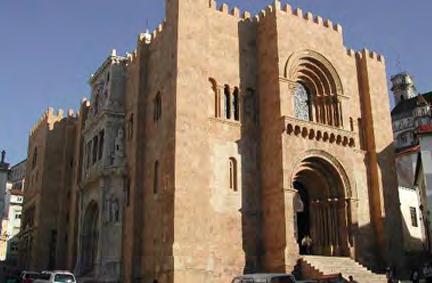
Salão Brazil makes part of Coimbra’s history, and since 2004, won a new dynamic as a restaurant, exposition room, and musical space, specially Jazz. This project is a big bet in an effort to restore the space, in all his cultural diversity and quality. It works very hard to be “the place to be”
All of this and more, in a centenary building with the most pure and beautiful architecture that our city has to offer, deep in the heart of Coimbra!


 Old Cathedral (Sé Velha)
New Cathedral (Sé Nova)
Biblioteca Joanina (Library)
Young People’s Portugal (Portugal dos Pequenitos)
Old Cathedral (Sé Velha)
New Cathedral (Sé Nova)
Biblioteca Joanina (Library)
Young People’s Portugal (Portugal dos Pequenitos)
Coimbra Youth Hostel
Adress: Rua Dr. Henriques Seco, 14 3000-145 Coimbra



How to get there: Praça da República – Rua Lourenço de Almeida Azevedo – Rua Dr. Henriques Seco
Room types: Couple shared bathroom 14€ Woman 4 beds 12€ Men 6 beds 12€
Serenata Hostel
Coimbra

Adress: Largo da Sé Velha, 21/23, Coimbra, Portugal
How to get there: Near to Sé Velha
Room types: Bed in 10 dorm 17€ Bed in 12 dorm (female) 17€ Bed in 4 dorm 19€ Bed in 8 dorm 19€ Double room 44€ (per room) Double room, private wc 49€ (per room) Double room/double bed 44€ (per room) Doule room/double bed, private wc 49€ (per room) Superior Double room/king size bed, private wc 65€ (per room)
Others: 24 hours reception, Breakfast included, kitchen, dinner room, cable tv, room with library
Dream On Coimbra Hostel
Adress: Avenida D. Afonso Henriques nº 31 3000-010 Coimbra, Portugal
How to get there: Praça da República- Rua Tomar –Av. Dom Afonso Henriques
Room Types: Bed in 6 dorm, shared bathroom 14€ Bed in 4 dorm, shared bathroom 16€ Bed in 2 dorm, shared bathroom 17€ Double , shared bathroom 19€
Others: Breakfast Included, Cable TV, Common Room, Free City Maps, Free WiFi, Hot Showers, Housekeepingn, Internet Access, Kitchen, Laundry Facilities, Linen Included, Lockers, Luggage Storage, Reading Light, Towels for hire, Washing machine
Rock Planet

The place is decorated in the 80s rock style, with autographed albums,guitars, cars, motorcycles and even a train! Rock, Pop rock, and International music.
Cabido Bar
Close to the Sé Velha (one of the most popular points in the city), with packs of beers and shots at cheap prices, is much frequented by Erasmus students, mostly Brazilians.
Bigorna Bar
Small bar, close to the Sé Velha in the old part of the city, with a great vibe and alternative music. It’s cheap, it’s cool, and an Erasmus hotspot.

AAC Bar Bar of Coimbra's Students Association.

Known as the Snow Town, Covilhã is a small city in Serra da Estrela, near the Torre (Tower) the highest point in Mainland Portugal.

The proximity to the mountains offers great entertainment for those fond of hiking, camping, mountain climbing and skiing.
Covilhã is also the land of the wool industry and birthplace of explorers. Therefore, there are some museums, either in Covilhã or Belmonte, about these themes.
In a study conducted by the newspaper Expresso, about the quality of life in Portuguese cities, Covilhã occupies the 14th position, getting better classified than most inland cities.
The University of Beira Interior ( UBI ) was founded in 1986. It comprises a set of Colleges, Departments and Centres that extend and the region in a spotlight position regarding the scientific and artistic knowledge.

The history of this institution begins in 1973, when the Polytechnic Institute of Covilhã was created. According to the local tradition of became known as the Portuguese Manchester for its long tradition in textile production), its first students enrolled in courses Textile Engineering and Management and Accounting in 1975. In 1979 it changed its name University Institute of Beira Interior and, finally, since 1986 it has the title of
The Faculty of Health Sciences (FCS) is a college that teaches courses in healthcare, part of the University of Beira Interior. It began work in 2001in temporary facilities with the beginning of the medical course at this institution. Being the most recent of all Campus, its building was raised in 2004.
Localisation: http://goo.gl/maps/jUOpk
Local Committee
The Medical Students Association of the University of Beira Interior (MedUBI) was established in 2002. Since then, MedUBI is part of the National Association of Medical Students - ANEM/PorMSIC.
MedUBI believes that the experience of attending the University is more than just receive academic training, it’s also to promote personal growth, social and human level, to develop skills and to extend horizons.
Besides the enrichment of the students, creating a positive effect on health promotion and disease prevention amongst students and community is also a goal of this medical students association.

Therefore, MedUBI organizes several cultural, recreational, social, sporting and public health activities.

Hospital
The Centro Hospitalar da Cova da Beira (CHCB) is the main establishment for provision of healthcare for the populations of Covilhã, Fundão, Belmonte and Penamacor.

Built in 2000, it has become one of the Teaching Hospitals of University of the Beira Interior. In March 2009 it received the certification from Joint Comission International, being the 3rd establishment of Portugal awarded. The certification was revalidated in 2013 as an Academic Medical Center, becoming the first Portuguese Hospital and the 17th in the World receiving that evaluation.
In 2011 it had a total of 87.054 cases in the ER and 166.702 appointments.
Localisation: http://goo.gl/maps/NjpIy
NOT AVAILABLE: Forensic Medicine, Internal MedicineTropical Medicine, Occupational Medicine, Oncology, Paediatrics-Neurosurgery, Paediatrics-Oncology, Paediatrics-Surgery, Physiology, Physiotherapy, Primary Care, Surgery-Cardiothoracic Surgery, Surgery-Cardiovascular Surgery, Surgery-Head and Neck Surgery, Surgery-Maxillo-facial Surgery, Surgery-Neurosurgery, Tropical Medicine
Localisation:
CICS - Research Institution
The Health Sciences Research Centre is a research structure integrated in the Faculty of Health Sciences of the University of Beira Interior.
The mission of CICS is: to promote high quality scientific research in biotechnology, as well as in biomedical, clinical, and epidemiological areas and to contribute towards health education of the local population; to develop integrated and multidisciplinary research focused on the study of physiological and pathological mechanisms from the molecular level to the living organism.
Human resources of CICS include PhD and MD researchers working at the Medical Sciences and Chemistry Departments of UBI, and also graduate and undergraduate students with medical, pharmaceutical, biochemical, and biomedical background. The multidisciplinary background of the researchers guaranties the development of integrated projects in the field of biomedicine.

Getting to Covilhã
From Lisbon
By Train
1) Get from the airport to the train station: http://goo.gl/maps/LImC0

2) Take an IC Train towards Covilhã (www.cp.pt)
By Bus
1) Get from the airport to the bus station: http://goo.gl/maps/SIOwA
2) Take a bus to Covilhã (www.redeexpressos.pt)
FROM PORTO
Only Bus is available
1) Get from the airport to the bus station: http://goo.gl/maps/F3ZyL
2) Take a bus to Covilhã (www.redeexpressos.pt)

Informations
Lodging
Students coming in July will be staying at the dorm of the University. They may share the room with one more exchange student, and will have access to a common kitchen.
Students coming in other months may either stay in the dorm or at a Portuguese Student house.

Boarding
Students will have free lunch at the hospital cafeteria from Monday to Friday.
Transports
In




Social Program
Before the incomings's arrival they should answer to a questionnaire about their preferences, so all activities are always prepared according to that. We may also repeat one or another, if they wish.
Our final calendar is very full, but we try not to schedule any activities for the same hours of the internship.
To receive by the best way, we may organize a photo paper and a pub crawl, so incomings could meet the town by a fun way.
Once Covilhã is the nearest city from the highest point of Estrela Mountain, it's almost certain that none of our incomings has ever went gone without going there. The hills of this Mountain are fulfilled of river beaches and breathtaking landscapes.

Our faculty is known by the clinical simulation lab and the simulation models we own, so we want that our incomings have the opportunity to learn in that lab with qualified tutors's supervision how to react on clinical emergency situations.
Because we know that for being in exchange program the students spend a lot of money, our local committee pays almost every cots of local social program, so the incomings just have to pay a little part of it.
Local Social Program is only available in summer.
Places of Interest





Jardim do Lago (Garden of the Lake)
Inaugurated in 2005, it’s the biggest green area of Covilhã. http://goo.gl/maps/bHC3s

Sports Complex
A pleasant place to go jogging, it’s open and free for every citizen. http://goo.gl/maps/ptlJ0

Teatro das Beiras (Theatre of Beiras)

A small and amateur theatre company. http://goo.gl/maps/eGH01

 Artificial Wave Pool
Pedestrian Bridge
Torre (Highest point in Mainland Portugal)
Cheese Museum
Artificial Wave Pool
Pedestrian Bridge
Torre (Highest point in Mainland Portugal)
Cheese Museum
Hotel Varanda dos Carquejais****
With a marvelous location on Serra da Estrela and panoramic views over Cova da Beira’s Valley, this mountain resort has an unique arquicteture with a modern decoration and an exterior swimming pool. Varanda dos Carquejais is a four stars hotel placed 15km away from Vodafone’s ski resort.
Single room: 49€



Hotel Covilhã Parque **
Placed on the city center, Hotel Covilhã Parque has Bar & Snack´s, laundry service, 24h reception and local office. It’s central location enables the pedestrian access to the recreational zone, restaurants and the city’s commercial zone.
Single room: 23€
Hotel Turismo da Covilhã ****

Hotel Turismo is placed on the city’s entrance facing the Central Hospital, Medicine University and 5 minutes away from the University da Beira Interior, the city centre, the train station and the trucking station .
Single room: 43€
Goldra Cybercafé

A nice place for an afternoon or early night coffee. Moreover, they also serve meals.
Closing time: 2am http://goo.gl/maps/n4u1l
Art Barô
One of the most famous bars to have drink at night, before you go a night club. You can also try out some steps in the dance floor.
Closing time: 4am http://goo.gl/maps/wH5HK
Companhia Club

By far the best nightclub of Covilhã, it’s a must if you want to know our nightlife. It has 2 dance floors and one lounge room, and it’s open until 6am. http://goo.gl/maps/DIWqA
Cantinho do Artista
It’s a small cozy establishment where you can eat a traditional spicy sausage with bread and drink some cheap wine while you listen to Fado. Closing time ~4/5 am. http://goo.gl/maps/PURjL


The first landmarks date from to the eighth century BC, the period of the Phoenician colonization of the western Mediterranean. The city name was Ossonoba, one of the most important urban centers of southern Portugal and commercial hub.

Following the independence of Portugal in 1143, the first king of Portugal D. Afonso Henriques and his successors initiated the expansion of the country to the south, regaining the territories occupied by the Moors . After the conquest by King Afonso III, in 1249, the Portuguese designated it the city of Santa Maria or Santa Maria of Faaron Faaram. King Manuel I in 1499 , did a deep urban change with the creation of new equipment in the city - a hospital, the Holy Spirit Church (Church of Mercy).
Until the end of the nineteenth century, the city remained within the limits of the walls. The city has grown more rapidly in recent decades.
School of Health of the University of the Algarve

In 2004, the Minister of Science, Innovation and Higher Education, proposes to University of Algarve the creation of a medical degree program. A year later, Professor José Ponte is nominated dean of the first graduate-entry Medicine program in Portugal.
In 2006, the University receives for the first time the Agency for Assessment and Accreditation of Higher Education - A3ES. The official approval announcement is made on 24th July 2008.

This is the first 4-year, graduate entry course in Europe outside the United Kingdom and Ireland, the curriculum is based on Problem Based Learning (PBL) and it is the first programme in Europe to offer clinical training clearly centred on primary care practice. Currently with 140 students and a completely innovative perspective, it truly represents a significant leap into the 21st Century for medical education in Portugal. The first batch of doctors (Masters in Medicine in Bologna parlance) graduated in July 2013. "
Local Committee
NEMed/AAUAlg is the medical students association at University of Algarve, Portugal.

Created in 2009, it brought together the efforts of many students, with the aim of promoting the unique paradigm that our medical degree at UAlg represents. Since 2009, it has been taken out an arduous path of integration, not only within the medical schools but also academic, medical and social institutions. Undoubtedly PorMSIC integration was a unique moment, a full recognition of our efforts and dedication towards a future for medical education in Portugal!
Every day we face new, different challenges, but our goal is to keep up the good work and expectedly grow more and more in the next few years, always defending the rights of our medical students as UAlg students and also as future doctors.
with each other. Many of the molecular and cellular mechanisms important in the biology of stem cells and in Organogenesis, such as control of cell division and proliferation and cell migration, are also involved in cancer. Given that fact, the scientific dialogue between researchers in these areas will not only facilitate the exchange of concepts and technologies but also enable further advancement of scientific knowledge.As the changes in cancer cells are identified, the knowledge and technology acquired within the area of Cell Therapy can be applied in the treatment of cancer.Moreover, the elucidation of the molecular mechanisms involved in stem cell biology, in organogenesis and in carcinogenesis, will provide the required framework for the development of more effective therapeutic strategies. It will also guide the identification of potential therapeutic approaches. In addition, the integration of the work of basic researchers and clinicians will allow access to important material of study (e.g., malignant tissues of patients) and direct application in clinical cases.



Getting to Faro
Faro has an airport. A contact person will be there to help you.
Informations

Lodging
Accommodation is usually in a rented apartment near Faro Hospital.


Transports


In the city of Faro there is an extensive bus network. Taxis are not too expensive and widely used. A very good option is also by foot.



Boarding
We provide one meal a day at the hospital canteen. We provide meal vouchers for the entire month. There is usually a choice between two plates. There is a vegetarian option.
Faro and all Algarve are very well known for the coast, the beach and its welcoming people. It is also a great place for nature lovers. It is also very well known for its nightlife! You will never forget thethe delights of the Algarve cuisine.

A trip to Sagres, to Tavira and to Vilamoura´s marina are mandatory. The costs of these trips and social program are at student charge, however it is common that a colleague offer to take you to all these wonderful places and more…
Some suggested activities are:
• Traveling along the coast
• Boating
• Going to different and amazing natural beaches
• Nightlife
• Visit typical villages/ cities (Tavira, Lagos, Portimão, Sagres...)
• Tasting the gastronomy of the Algarve
• Visit monuments/museums (Fortaleza de Sagres, Faro downtown,Roman Villa of Abicada...)
Social Program
Places of Interest









Baixa-Portugal Terrace Hostel
Rua de Portugal, nº36, Faro, Portugal



Price: 7€ to 16€ per night per person. Breakfast is included

Casa d'Alagoa
Praca Alexandre Herculano 27, Faro, Portugal
Price: 7.99€ to 19.99€ per night per person.
Hostel 33
Rua Miguel Bombarda Nº 33, Faro, Portugal
Price: 10€ to 17€ per night per person. Breakfast included.
O Castelo - Cidade Velha

Bar in the old part of the town, sea view.
Rua do Castelo 11, 8000-149 Faro
Bar Património Erasmus parties
Rua do Prior 19, Faro
Vilamoura Marina
Outside Faro (24 km)

Marina de Vilamoura 8125-406, Loulé Many bars, restaurants and night clubs

First Floor - Night Club Erasmus parties
Rua do Prior nº 39, 8000 Faro

Lisbon is one of the oldest cities in the world, and the oldest city in Western Europe, predating other modern European capitals such as London, Paris and Rome by hundreds of years. Julius Caesar made it a municipium called Felicitas Julia, adding to the name Olissipo. Ruled by a series of Germanic tribes from the 5th century, it was captured by the Moors in the 8th century. In 1147, the Crusaders under Afonso Henriques reconquered the city and since then it has been a major political, economic and cultural centre of Portugal and Europe.
The 16th century was Lisbon's golden era: the city was the capital of one of the first's Global Empires, and was a European hub of commerce between Africa, India, the Far East and later, Brazil.
The devastating earthquake at 1755, and loss of the empire left the city a little threadbare, but 21st century commerce took a hand, sprucing the place up for Euro 2004. Portugal may have been the runners up, but Lisbon emerged a winner.

Faculty of
Medicine
of the University of Lisbon
The Faculty of Medicine is a part of the University of Lisbon. Its origin dates back to the Royal School of Surgery created in 1825 at the São José Hospital, later renamed in 1911 Faculty of Medicine of the University of Lisbon.

The Faculty of Medicine of the University of Lisbon has its scientific roots on the pioneers of scientific Medicine in Portugal. It continues the tradition of Egas Moniz and other innovators that developed the Portuguese School of Angiography and introduced new surgical techniques for the treatment of vascular disorders.

By honouring its Past, the Faculty aims to contribute for the progress of Medical Sciences, to foster innovation and to develop a more humane, patient-centred and scientific-based Medicine.
Localisation: http://goo.gl/maps/QkYoG
Local Committee
AEFML stands for Associação de Estudantes da Faculdade de Medicina de Lisboa, meaning Students’ Association of the Lisbon Medical Faculty. Founded on the 30th September of 1914, it is one of the oldest students’ associations in Portugal, whose main objective is to represent and defend the students of our faculty, as well as to promote a wide range of extracurricular activities in several fields of the medical sciences.
The Department of International Affairs of AEFML is responsible for supporting the IFMSA’s Exchange students and provide them with a rich social and cultural program. Furthermore, we organize EMSA’s Twinning Project.

The Institute of Molecular Medicine (IMM) is our main research institute and it is one of the leading medical research institutes in Portugal. It’s mission is to foster and promote basic, clinical and translational scientific research in the medical field, with the aim of contributing to a better understanding of understanding disease mechanisms and developing new therapeutic approaches.



NOVA Medical School | FCM
The first cohort of students to finish their medical degree at Santana Campus of NOVA Medical School was the class of 1973-1980. They had been admitted at Universidade de Lisboa but started their lectures already as members of the “Santana Campus Extension” of the NOVA Medical School. They and their professors constituted the initial core that gave rise to NOVA Medical School.
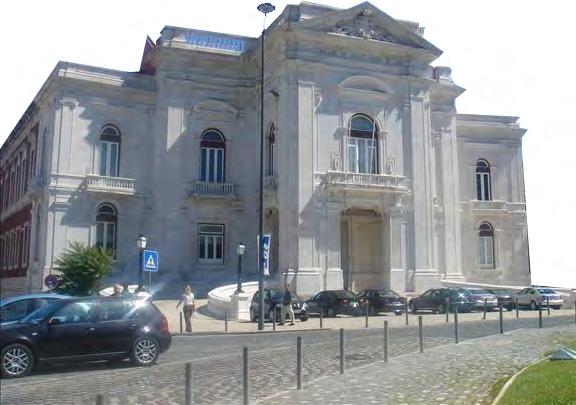
The school was innovative from start, using modern audiovisual tools and video recording classes, so that students could watch them at convenient times, something particularly beneficially for student workers.
Knowledge about these early years is paramount to understand the history of the school, founded right around the political unrest of 1974 and several other tribulations, thus shaping from the beginning a strong team spirit and a truly new and modern culture.
Localisation: http://goo.gl/maps/5imsA
Local Committee
The local committee for exchange is the responsibility of The Students' Association of NOVA Medical School | FCM (AEFCML).
Created in 1979, with more than a thousand members, is ruled by the basic principles of associativism – unicity, non-partisanship and secularism – and by the motto "by students, for students", AEFCML has been growing thanks to successful projects in the areas of Science & Investigation, Community Health, Culture, Sports and Medical Education.


The Chronic Diseases Research Center (CEDOC) lies at the heart of NOVA Medical School (NMS|FCM) bringing together biomedical, translational and clinical research under a collaborative spirit.
CEDOC hosts over 30 groups and nearly 200 Academics and Clinicians researchers devoted to understanding a variety of chronic pathologies, from diabetes to rare auto-immune diseases.


CEDOC open recently a state-of-the-art research building in the center of Lisbon just next to the school of medicine. These include animal facilities, bioimaging, cell culture facilities, teaching rooms and labs with specific equipment, and a Library specialized in Biomedicine.

Informations (FMUL)
Lodging
Exchange students will be lodged in student residences owned by the university’s social services: SASUL. You will be sleeping in double rooms with shared bathroom. The residences provide a fully equipped kitchen, laundry services, a common room and wifi. However, the residencies are not equipped with dishes. "
Buses
There are 2 major Bus companies in Lisbon: Carris and TST. TST (http://www.tsuldotejo.pt/) is a private company (tickets are usually more expensive) and travels mostly around the southern margin of the river Tagus. Carris (http://www.carris.pt/ ) is a public transportation company and has the advantage of travelling to some parts of Lisbon where the Metro (Subway) doesn’t reach.
Boarding
Students will receive 20 meal tickets (1 per day of clerkship) to eat at the Hospital Cafeteria. Meals include 1 soup, 1 main course with or without side salad, a bottle of water and 1 dessert.

Informations (NMS|FCM)
Lodging
The students will be accommodated in one of two halls of residence of NOVA university, All residences have a Laundry room equipped with a semi-industrial washing machine, drying rack, ironing boards and irons; Video and TV room and also wireless Internet connection.
Boarding
The students will receive meal tickets to provide one meal at the canteens.
The students can use the Hospital canteens (located at the Sâo José Hospital and Santo António Capuchos Hospital) and also the Faculty canteen.

Subway
The Lisbon underground metro works from 6h 30 a.m. up to 1h a.m. and the tickets costing around 1,40€ and are valid for one hour for both BUS and METRO Lines. It’s the transportation that we recommend, it is very cheap, safe and fast
FMUL
We offer a very rich and fullfiling social programme in the summer months, as most of our exchange students come in July and August.
Our Local Programme boasts various themed dinners and parties, including a welcome party, an international dinner, and dinners in typical portuguese restaurants. Besides, we organize trips to various monuments, plan beach days and surfing lessons. These activities are paid by the participants.
We also team up with the other Portuguese Medical Schools to organize the National Social Weekends in Lisboa and Porto, providing you with a wider experience of Portugal.

NMS|FCM
The social program consists of a wide range of activities since knowing the Lisbon night , concerts, city tours and other more decentralised locations.
Activities include:
• Knowing the major places of Lisbon Night (Bairro Alto, Santos, major bars and discos)
• Walking tours and visits to the major city monuments
• Visit other spots at Lisbon District (Sintra and Cascais)

• Trips to the main beaches (Cascais region, Costa da Caparica)
All costs are supported by the students.

Places of Interest






Calouste Gulbenkian Museum and Gardens
It was founded by petroleum mogul Calouste Gulbenkian and sharp by the foundation bearing his name, this facility contains 3 concert halls, 2 galleries and an orchestra. Comprehensive exhibits feature Egyptian, Oriental, European art and Greco-Roman and boast names such as Rembrandt, Ruebens, and Renoir.
This is located in Avenida de Berna.


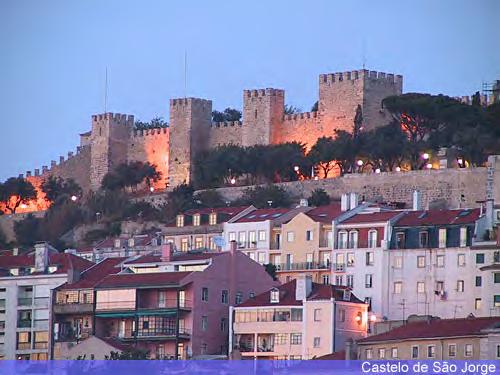
 Castelo de S. Jorge (Saint George’s Castle)
Torre de Belém (Tower of Belém)
Baixa (Downtown Lisbon)
Mosteiro dos Jerónimos (Jeronimos Monastery)
Castelo de S. Jorge (Saint George’s Castle)
Torre de Belém (Tower of Belém)
Baixa (Downtown Lisbon)
Mosteiro dos Jerónimos (Jeronimos Monastery)
Golden Tram Hostel
A landmark building from 1922 facing one of the city's most iconic landmarks (the Santa Justa Elevator) was renovated to become this hostel spread over five floors.
In total there are 20 rooms, a lounge bar and living room for guests to meet and relax.
Preço médio: 22 euros por noite
Hostel Salitre
Hostel Salitre is a perfect hostel for students and backpackers. Just 50 metres from Largo do Rato, this hostel offers bright rooms with shared bathrooms. You can walk both to Marquês de Pombal and Avenida da Liberdade. Doorms from 12 euros. Private rooms from 15 euros.

Travellers House Hostel
Spread over four floors in the city's main pedestrian street (Rua Augusta), this hostel has consistently ranked as the best in the world.

It has 12 dorms (with six and four beds) and two double rooms, but it's the convenient location and the common areas for music, TV and the internet that attracts most guests.
Preço médio: 24 euros por noite



Bairro Alto


Bairro Alto is an old and traditional neighbourhood, home to the biggest cluster of bars probably in all of Europe. Not long after the sunset, the restaurants and bars open their doors and crowds show up from everywhere, spilling out from the small bars and creating a street party atmosphere. Rock, metal, reggae, gay and lesbian, chill-out, virtually whatever you want!
Clube Ferroviário

Clube Ferroviário: It's a bar, it's a club, it's really a one-of-a-kind place with an eclectic calendar of events.
It's also one of the hottest terraces since it opened in the summer of 2010, although there are several rooms inside for concerts and lounging to the sound of DJ mixes.
It's also open in the afternoon, allowing you to go for a drink and light meals as you overlook the river. A brunch is also served on Sundays.
MAIN
For many years this place was the legendary club Kapital. Now it's divided into three different spaces, the "Main Zero" on the ground floor, the "Main Room" upstairs, and the "Main Air" above. "Zero" is a club, "Room" is a stylish bar and "Air" is a restaurant.
The club is open from Thursday to Saturday starting at midnight, the bar also only on those days starting at 11PM, while the restaurant serves dinner from Tuesday through Saturday.

Porto was built along the hills overlooking the Douro river estuary. It has been continuously inhabited since at least the 4th Century, when the Romans referred to it as Portus Calle.
Bridges and port wine characterize Porto, Portugal's gracious northern capital and second largest city after Lisbon. The main reason tourists or travelers visit Oporto is to sample its legendary Port wine, which is processed, blended and aged in the various lodges of Vila Nova de Gaia that are magnificently located by the banks of the great Douro River.
Still a thriving industrial centre and Portugal’s second-largest city, Porto blends industry with charm. In 2001 the city, the historic centre of which is a UNESCO World Heritage site, was the European Capital of Culture.

Faculty of Medicine of the University of Porto
In 1825, the first medical school was founded in Porto, entitled the Royal School of Surgery, which was transformed in 1836 into the Medical-Surgical School. The Faculty of Medicine of the University of Porto was created by a decree in 1911. The inauguration of Hospital S. João occurred on June 24, 1959 and as a result of the acquired status of Teaching Hospital, the Faculty of Medicine was installed in the Hospital which until that date had the use of some wards of Hospital Santo António.
Today, the Faculty of Medicine of the University of Porto is a prestigious institution at national and international levels, the one that requires the highest marks for entry to the course of the degree in Medicine.
Localisation: http://goo.gl/maps/6L4et
Local Committee
The Students Committee of the Faculty of Medicine of the University of Porto (Associação de Estudantes da Faculdade de Medicina da Universidade do Porto) was legally established as the AEFMUP in 1982.


Since its conception, it has set its objectives as the representation of all students of the Faculty of Medicine, as well as promoting their training in curricular, scientific, educational, cultural, social, physical and personal aspects, contributing to the improvement of education in the University and its connection to the community.
Hospital de São João
The Hospital of São João was inaugurated in 1959 as a teaching hospital, connected to the Faculty of Medicine of the University of Porto.

NOT AVAILABLE: Cardiology.
Localisation: http://goo.gl/maps/6L4et

Abel Salazar Biomedical Sciences Institute
Instituto de Ciências Biomédicas Abel Salazar - ICBAS - is one of the faculties of University of Porto, dedicated to Medicine, Veterinary Medicine, Aquatic Sciences, Biochemistry and Bioengineering.

It appeared in 1975, and it is named after Abel Salazar (1889-1946), a Portuguese physician, lecturer, researcher and painter who worked and lived in Porto. On the main hall of the Institute's old building, the famous maxim of Abel Salazar can be read: "The one who only knows Medicine, not even Medicine knows”.
Localisation: http://goo.gl/maps/E2YN8
Local Committee
ICBAS' Student's Association is the association officially representing the students of the faculty, and has been founded on May 22nd 1986. Represents about 2300 students of all degrees available in the faculty.
Hospital de Santo António


Hospital de Santo António is placed in Porto's downtown. It was designed by the English architect John Carr and it started to be built in July 1770. Although being a building of great historical and architectural value, it is one of the most modern and well-equipped hospitals in the country, being a reference in providing quality healthcare.
NOT AVAILABLE: Plastic surgery, Cardiovascular surgery, Forensic Medicine, Internal Medicine-Tropical Medicine, Occupational Medicine, Psychiatry, Sports Medicine, Traumatology, Tropical Medicine, Allergy & Clinical Immunology, family medicine, Infectious diseases, Internal Medicine-Invasive Cardiology, Internal Medicine-Nephrology, Internal Medicine-Rheumatology, Nuclear Medicine, Occupational Medicine, Neonatal-Perinatal Medicine, Paediatrics-Oncology, PaediatricsNeurosurgery, Parasitology, Physiotherapy, Primary Care, SurgeryCardiovascular Surgery, Surgery-Gastrointestinal Surgery, SurgeryHead and Neck Surgery, Surgery-Vascular Sugery, Traumatology"
Localisation: http://goo.gl/maps/9kZuM

Informations (FMUP)
Lodging
Lodging will be in the University of Porto student dorms. Most rooms are single, toilets and showers are shared and each floor is strictly for male or female students.
Laundry room and kitchen are available. We will lend you kitchen supplies, but you will be asked to leave a deposit (5€).
Boarding
You will be given one lunch ticket per weekday.
The Faculty of Medicine canteen is located in the hospital grounds. The canteen closes for personnel holidays during one week in August, during which time another University canteen will be available.

Transports
We will offer you a simple monthly pass for public transportation around the city center and the hospital surroundings (you will only have to pay 5€, the price of the card itself).
A single ticket for Metro and/or bus costs €1,20. Combined tickets for buses, Metro and train within the urban area of Oporto cost €7 for one day and €15 for three days.
For further information visit the following websites: BUS | www.stcp.pt
Informations (ICBAS)
Lodging

We will lodge you in one of the University of Porto’s student residence. Most rooms are single, toilets and showers are shared. Male and Female students are lodged on different floor of the residence. Depending on which student residence is available at the time, there may be a kitchen or otherwise a canteen that serves meals during the weekend and evenings. The residences have a common living room with TV and internet connection. Laundry rooms are also available.
Boarding
You will receive one lunch ticket on every working day of the exchange month (Monday to Friday). This lunch is for the Institute of Biomedical Sciences Abel Salazar Canteen where there is always a Meat, Fish and Vegetarian dish at choice. In August the Institute Canteen is close for holidays and so the meals will be served at another nearby canteen of the University of Porto.
Transports
To move inside Porto you can use both Subway (Metro) and Bus (STCP), both really easy to use. It's also possible to walk to most places, in few time.
FMUP
The Local Social Programm will include: Welcome Dinner, Beach activities, visits to Museums, Visit to Braga, Visit to Guimarães, Weekend in Aveiro and Coimbra, Farewell Dinner. The programme and costs will be sent by email and adjusted to the group's preferences.

ICBAS
The local social program will include getting to know the wonders of Porto, from the sightseeing to the gastronomy; as well as visiting other cities in Portugal nearby, like Aveiro, Braga or Coimbra. The payment will be of the students' responsibility.
Social Program
Places of Interest
The




Praça da Liberdade (Liberty Plaza)




Park of Serralves
 Gardens of Palácio de Cristal
Cathedral
Gardens of Palácio de Cristal
Cathedral
Tattva Design Hostel
Inspired from the Sanskrit word meaning 'Element', representing the five elements from which life evolves: Earth, Water, Air, Fire and Sky. Tattva Design Hostel will give you an enhanced hostel experience. Details and design have been carefully blended to create a new level of comfort and intimacy, as well as plenty of common areas in which to socialize.
Price: under €20
Gallery Hostel Porto
Located in the trendiest quarter of Porto, between art district and nightlife, the ecofriendly Gallery Hostel characterises the new concept of a luxury hostel, where best service, cleanliness and facilities are top priorities along with friendliness and familiar atmosphere. Price: 20-30€ www.gallery-hostel.com

Rivoli Cinema Hostel
Rivoli Cinema Hostel is the first Cinema themed Hostel in Portugal, and here you can find 12 rooms each one about a different film. You can choose a room by a Director or by a Film, and the interior of the room is decorated with things about the film.
Price: under €20



Capa Negra II

Type of food: Francesinha
Average Price: 12€
Piolho
One of Porto most known cafe amongst the Students. It is usually a hotspot or meeting point before going out clubbing and is usually crowded with people at night!
Cafe Majestic
"... it is in the country's second city that we find the most stunning of all cafés in the nation and one of the most attractive in the world. “
In Top 10 Most BEAUTIFUL CAFES in the World, ucityguides.com
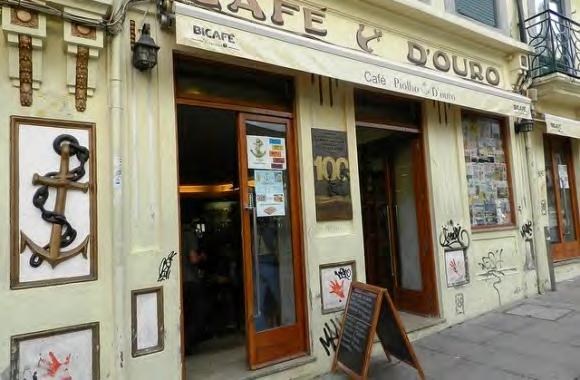
Rua da Galeria de Paris
Nowadays, the area is a high point of evening entertainment in Porto, particularly at the weekends. Around this street discos, pubs and bares for almost every taste can be found.



